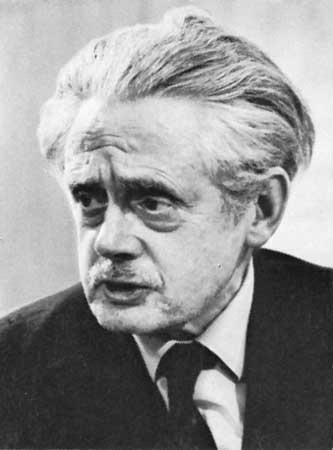MacDiarmid, Hugh
Scottish poet
pseudonym of Christopher Murray Grieve
born Aug. 11, 1892, Langholm, Dumfriesshire, Scot.
died Sept. 9, 1978, Edinburgh
 preeminent Scottish poet of the first half of the 20th century and leader of the Scottish literary renaissance.
preeminent Scottish poet of the first half of the 20th century and leader of the Scottish literary renaissance.The son of a postman, MacDiarmid was educated at Langholm Academy and the University of Edinburgh. After serving in World War I he became a journalist in Montrose, Angus, where he edited three issues of the first postwar Scottish verse anthology, Northern Numbers (1921–23). In 1922 he founded the monthly Scottish Chapbook, in which he advocated a Scottish literary revival and published the lyrics of “Hugh MacDiarmid,” later collected as Sangschaw (1925) and Penny Wheep (1926). Rejecting English as a medium for Scottish poetry, MacDiarmid scrutinized the pretensions and hypocrisies of modern society in verse written in “synthetic Scots,” an amalgam of elements from various middle Scots dialects and folk ballads and other literary sources. He achieved notable success both in his lyrics and in A Drunk Man Looks at the Thistle (1926), an extended rhapsody ranging from investigation of his own personality to exploration of the mysteries of space and time. Later, as he became increasingly involved in metaphysical speculation and accepted Marxist philosophy, he wrote Scotticized English in To Circumjack Cencrastus (1930) and archaic Scots in Scots Unbound (1932), then returned to standard English in Stony Limits (1934) and Second Hymn to Lenin (1935). His later style was best represented in A Kist of Whistles (1947) and In Memoriam James Joyce (1955). Autobiographical volumes include Lucky Poet (1943) and The Company I've Kept (1966). His Complete Poems appeared in 1974. MacDiarmid became professor of literature to the Royal Scottish Academy (1974) and president of the Poetry Society (1976).
- Noto Peninsula
- notopterid
- Notoungulata
- Notre-Dame de Paris
- Notre Dame Mountains
- Notre-Dame school
- Notre Dame, University of
- Nottawasaga Bay
- Nottaway River
- Nottely River
- Nottingham
- Nottingham, Charles Howard, 1st Earl of
- Nottingham, Heneage Finch, 1st Earl of, Baron Finch Of Daventry
- Nottinghamshire
- Nouakchott
- nougat
- Nougé, Paul
- noumenon
- Nouméa
- Nourrit, Adolphe
- Nouvelle Amsterdam
- nouvelle artificial intelligence
- nouvelle cuisine
- Nouvelle Revue française, La
- Nouâdhibou